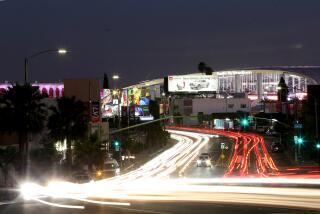Opinion: If NFL comes back to L.A., will taxpayers end up paying for it?
Wrigley Field. Fenway Park. Yankee Stadium. These venerable sports stadiums were built and paid for by the professional teams that played in them during the early years of the 20th century. By the end of the century, however, billion-dollar franchises were routinely persuading cities and other municipalities to build them new arenas and renovate old ones at taxpayer expense.
Teams argued that cities more than made up for the expense in the form of taxes, job creation and the multiplier effect. But studies showed that most of the jobs -- of which there were fewer than one would like -- paid poorly, such as minimum-wage workers selling concessions. Cities got fleeced; team owners lived like kings.
Los Angeles Mayor Eric Garcetti’s recent statement about the possibility of professional football returning to the City of Angels may mark a turning point in the once reflexive willingness of local government to subsidize one of the most wildly profitable private businesses in the country.
First the good news: An NFL team, Garcetti said on the radio this week, is “highly likely” to come back to L.A. within a year. “Football is something a big city should have,” Garcetti said, and he’s right.
More interviews, at least for fiscal conservatives: Garcetti is willing to spend
“exactly zero dollars” to make it happen.
Times sports columnist Bill Dwyre imagines a scenario of how this all might play out.
Garcetti deserves to be commended for drawing his line in the sand. Beginning in the 1970s and 1980s, the public sector has been subsidizing a profitable private sector at taxpayers’ expense, and frankly, it has gone too far.
The public domain has been looted and starved for resources with very little in return, whether it was from so-called school vouchers that redirect funding for public education to unaccountable private schools, or Pentagon contracts with Blackwater and other private security firms, or municipalities that waive taxes for 10 years and build highways to industrial plants that end up closing a few years later after having employed hardly any local workers -- the list goes on.
Publicly funded sports stadiums may not be the most egregious example, but they are one of the most obvious, and thus galling. If mayors around the country see Garcetti’s refusal to cave in to the NFL bear fruition in the form of the return of pro football -- without a municipal subsidy -- I wouldn’t be surprised if they were to follow suit in future negotiations.
The NFL brings in about $10 billion a year -- and as a legal nonprofit, the league doesn’t even have to share any of that with Uncle Sam (though the franchise teams do pay taxes through another entity).
Why on Earth anyone ever thought that it was a good idea for cash-strapped cities to pay them even more money is beyond comprehension.
Follow Ted Rall on Twitter @tedrall
More to Read
A cure for the common opinion
Get thought-provoking perspectives with our weekly newsletter.
You may occasionally receive promotional content from the Los Angeles Times.










